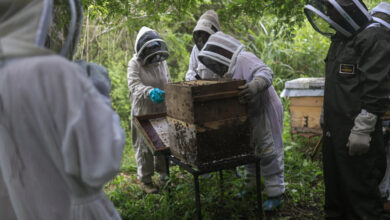Isabel Allende’s Perspective On Border Violence
Isabel Allende: "As you know, there is a serious humanitarian crisis at the Mexico border. The government has implemented a zero tolerance policy and ordered the separation of families arriving to seek asylum. This was already happening before the official order. Thousands of children, including breastfeeding infants, have been separated from their families, forcibly taken from their mothers' arms. […] This was publicly known since May of the previous year, when the first television report appeared. The national outrage was deafening, and the rest of the world was also deeply affected by the images of children crammed in cages, lying on the floor, dirty, and crying."

The Woman Post | Ayda María Martínez Ipuz
Escucha este artículo
In this way, Isabel Allende addresses the humanitarian crisis generated by the wave of migration at the border between Mexico and the US. Her new book, presented globally, titled "The Wind Knows My Name," intertwines stories from a similar situation during World War II and the present, exploring the sacrifices parents make to protect their children, the astonishing resilience of some children in the face of violence while still dreaming, and the tenacity of hope, which can shine even in the darkest moments.
Read more content like this at: thewomanpost.com
As the most widely read and translated living Latin American author in the world, she returns with current universal themes that touch everyone and seek to stimulate discussion about human actions that need to change for the betterment of society, even if "I don't try to preach but rather to talk about something that matters a lot to me, no matter how tragic the story," she said.
Tribute to the women
For the author, this book is also a tribute to the women who strive to change the reality of the border phenomenon. They are lawyers, social workers, and volunteers she has come to know through her foundation, established in 1996 under her name, which works to change the reality for children at the border who have not been able to reunite with their families.
"When patriarchy ends, which is the ultimate goal of evolution, societies will be better, although it has taken longer than I thought. We need to change to a more inclusive model than what we have today," she stated during one of the most important global launches for Penguin Random House in 2023. The book will be released in English under the Ballantine imprint and in Spanish under Plaza & Janés, and it will be distributed simultaneously in Spain, the United States, and Latin America in print, digital, and audiobook formats.
The novel begins with the story of Samuel Adler, an Austrian Jewish boy who, after Kristallnacht, is sent by his mother to England through the Kindertransport program, which saved thousands of children during the Holocaust, but he never saw his family again. According to Allende, this provided her with a story from 1939 to develop a tragedy in the present that repeats itself eight decades later at the Mexico-US border.
Present History
Anita Díaz boards a train with her mother to escape imminent danger in El Salvador and seek exile in the United States, as others had done before to escape one of the cruelest massacres still remembered today: the El Mozote massacre in 1981. Anita and her mother's arrival at the Mexican border coincides with a new government policy that separates them, leaving Anita alone in a foreign world she does not understand. Frightened, disoriented, and forced into orphanhood, Anita takes refuge in Azabahar, a magical world in her imagination. While she hopes that social worker Selena Durán and lawyer Frank Angileri, two fighters from an NGO, will reunite her with her mother and offer her a better future.
"This novel tells a tragic story, but I have narrated it with joy because it is also a story of courage and kindness. It was inspired by the wonderful people who work to alleviate the pain of the less fortunate," said the Chilean writer, who describes herself as an "eternal foreigner," drawing from her personal experience, incorporating the stories of one of her best friends, with whom she shares a cappuccino every afternoon, a Salvadoran who was exiled from her country.
You can also read about Michelle Obama's Book
"When I was a child, I lived in an imaginary world that took place in my grandfather's basement. There I had books, candles to read, and a world in which I believed my deceased grandmother accompanied me. That is Anita, whom I have also seen in the children at the border. They stop speaking and create silence in which they feel safer. It is a tragedy that will accompany them throughout their lives," recounted the author, who confessed that it was an easy investigation not only because of her foundation but also because it is happening now.
"Samuel, Leticia, and Alicia are my favorite characters. Samuel is the backbone of the book, Leticia is inspired by a friend of mine whom I see every day for coffee and who escaped El Salvador due to violence, and Anita, a girl I already knew," detailed the author, who self-identifies as a feminist, a label that is more accepted in society today.
Positive changes
"In my 80 years, I have seen positive changes. For many years, being a feminist was an insult, but now it is a reality. Gender parity is accepted by all. However, there are tremendous setbacks: suddenly, something happens with the Taliban, and professional women must lock themselves in their homes and wear a burqa. In the US, there are setbacks with the abortion ban, and in Venezuela, there is a scarcity of contraceptives," she lamented




